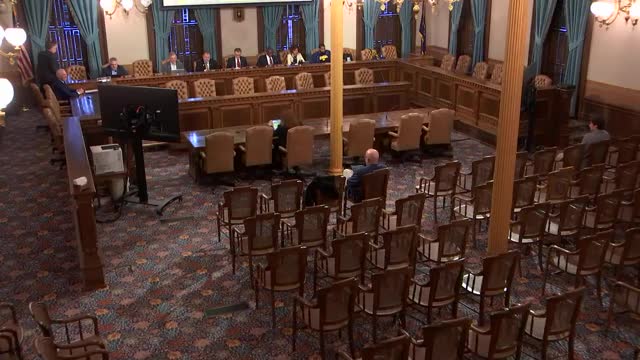Michigan Farm Bureau tells appropriations subcommittee it will expand education and hunger‑relief efforts, explore venison donation
Get AI-powered insights, summaries, and transcripts
Subscribe
Summary
Rebecca Park, legislative counsel for Michigan Farm Bureau, told the House Appropriations Subcommittee on Agriculture, Rural Development and the Department of Natural Resources that the century‑old organization aims to expand education and hunger‑relief programs and engage on several policy items before the Legislature.
Rebecca Park, legislative counsel for Michigan Farm Bureau, told the House Appropriations Subcommittee on Agriculture, Rural Development and the Department of Natural Resources that the century‑old organization aims to expand education and hunger‑relief programs and engage on several policy items before the Legislature.
"I am Rebecca Park with Michigan Farm Bureau," Park said, opening a brief overview of the group’s outreach and policy priorities. She said Farm Bureau represents more than 41,000 farm families and highlighted classroom education, county‑level policy development and partnerships with Michigan State University.
Park described a long‑running Farm Bureau effort called “farm science” that takes curriculum and demonstrations to kindergarten through fifth‑grade classrooms and fairs. She said the group ships about 400 “farm crates” monthly and that since 2017 the program has reached roughly 10,000 students and 400 educators. Park told the panel Farm Bureau provides educator outreach and aligns lessons with state science standards.
On hunger relief, Park said the organization started a social mission in 2022 to help end childhood hunger through volunteer service and fundraising. She described statewide volunteer days and “Teamwork Tuesdays” at the Farm Bureau home office; Farm Bureau logged more than 1,200 volunteer hours in 2024, she said. The group also uses a charitable trust to coordinate matching grants between insurance agents and county Farm Bureaus to support local school districts.
Park said Farm Bureau is forming a committee on venison donation that will include farmer members, insurance agents and staff. The committee’s goals, she said, are to take deer removed from roads or fields and route them into charitable food systems to reduce crop damage and supply protein to food banks. "We're hoping that by taking deer off the road, out of the fields... we can have a really great win for all," Park said. She cautioned that the venison committee was newly formed and that details remain under development.
Park told committee members Farm Bureau will engage on a set of policy priorities in the coming year, including continued support for the Michigan Agricultural Environmental Assurance Program (MEAP), which she said should remain voluntary with confidentiality protections for participants. She also said Farm Bureau will participate in upcoming cottage‑food discussions and conversations about vocational education and the Michigan Merit Curriculum.
Committee members asked Park questions about MEAP, extreme weather and PFAS contamination. On MEAP she said Farm Bureau values the program’s voluntary nature and confidentiality and is willing to discuss funding levels. On extreme weather she said impacts vary by region and year and that climate‑resiliency research can help farmers preserve soil and productivity. On PFAS Park said she had no statewide contamination figures available from Farm Bureau and offered to follow up with members who track the research.
Park concluded by describing Farm Bureau’s grassroots policy process: county delegates propose resolutions that are reviewed by a state policy committee and then voted on by delegates at the annual meeting in Grand Rapids. She invited committee members to contact her office for copies of the Farm Bureau policy book.
At the start of the session Rep. Decena moved to approve the minutes from the committee’s March 12, 2025 meeting; the chair announced approval without objection.
The presentation and Q&A lasted about 40 minutes and concluded when the subcommittee moved to its next speaker.
